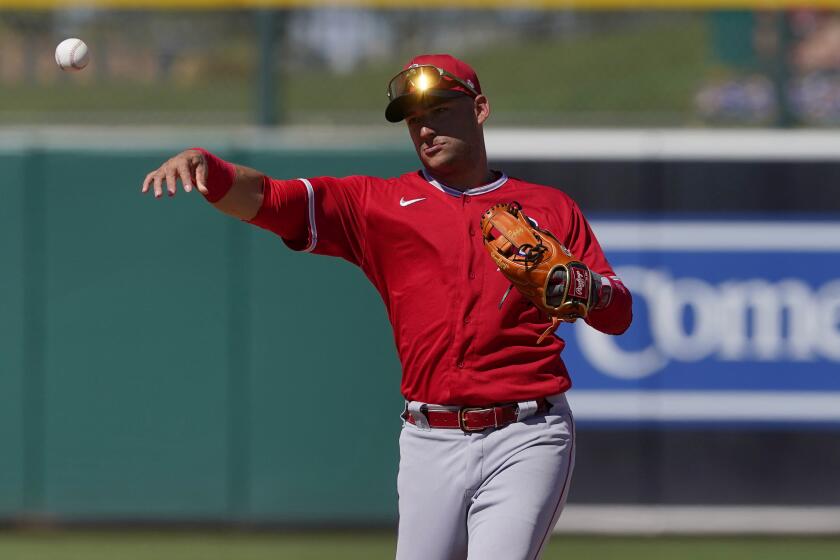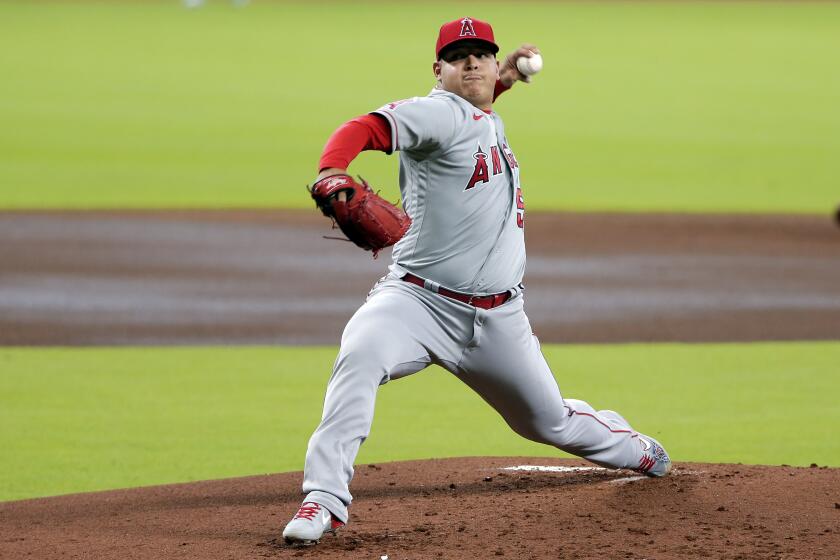‘He just wants to make everybody better’: Kurt Suzuki infuses Angels with zeal
- Share via
TEMPE, Ariz. — Dallas Braden thought he was an early riser.
As a young pitcher with the Oakland Athletics’ instructional league team in 2004, Braden would drive to the facility no later than 7 a.m. Usually, he was there before most other players. But there was one teammate he never beat.
From the start of his career, Kurt Suzuki was always the first guy in the building.
“Kurt was probably on his second workout when we would roll into the building. You could almost figure out where he was going to be by looking at the clock,” Braden said. “That gives a clubhouse a sense of calm. You can identify who the workhorses are, and you can look at the guys who you know are going to lead by example. Kurt’s one of those.”
For all Suzuki has accomplished in 14 major league seasons — a World Series title, an All-Star selection, more than 1,500 games and 1,300 hits — these are the stories people from his past love to tell, vivid memories of Suzuki’s leadership around the clubhouse, or during a team meeting, or in the midst of a game.
It’s a big reason why the Angels signed the 37-year-old catcher to a one-year contract this winter, one of several veteran acquisitions by new general manager Perry Minasian.
José Iglesias doesn’t seem to be feeling pressure replacing Gold Glove winner Andrelton Simmons at shortstop for the Angels, turning in jaw-dropping plays.
After five consecutive losing seasons, the Angels hope Suzuki — along with other offseason additions Dexter Fowler, José Quintana and José Iglesias, plus returning team leaders in Mike Trout, Anthony Rendon and others — can promote a culture change that everyone from Minasian to manager Joe Maddon insists is necessary to maximize the roster’s potential.
“You’re together for so long, so many days, that you need to build this bond, this chemistry,” Suzuki said. “You become like a family. And to win, I believe we can’t just rely on talent.”
***
During his first full professional season in the A’s minor league system in 2005, Suzuki called his old Cal State Fullerton coach, George Horton, looking for advice.
“What is it?” Horton asked.
“My manager,” Suzuki replied. “He’s really trying to keep me from being so enthusiastic.”
Horton laughed at the memory. He told Suzuki — who in college had gone from an unheralded walk-on to an All-American on a national championship winning team — that pro ball is different, and maybe he could find more subtle means of expression. But he also cautioned him not to change.
“He gets as much joy out of team success and teammate success as he does his own,” Horton said.
And it didn’t take long for teammates such as Braden, who played with Suzuki in the majors from 2007 to 2011, to notice.
Even as a young catcher, Suzuki had a gift of communicating with a pitching staff. With some pitchers, he was calm and composed, building their confidence. With the boisterous Braden — nicknamed “209” for his hometown Stockton area code stomach tattoo — Suzuki knew a more abrasive style was required.
“He would say, ‘Hey, 209! Get it together. What are you doing? Let’s go!’” Braden said, laughing, while recalling their typical mound visits. “One time he came out to deliver that message, and simultaneously hit me right in the crotch. . . . It was hilarious, and I remember after the inning, he came in and was like, ‘Is that what I gotta do every time?’”
In Braden’s last career game in 2011, injuries had robbed the left-hander of his fastball velocity. So, during a more subdued mount visit, he and Suzuki concocted a different plan.
“All in one motion,” Braden said, “he just turned around and lowered his mask and goes, ‘All right, throw the changeup.’”
It worked. Braden gave up only one run in five innings, earning his MLB final win.
***
When Rendon broke into the big leagues in 2013, he quickly noticed an unspoken rule with the Washington Nationals.
On trips, rookies took the bus to the stadium. Veterans found their own ride.
Suzuki, who was traded to the Nationals midway through the previous season, had his own system. He would invite rookies like Rendon to share a cab to games.
“I would always try to pay or pitch in,” Rendon said, “and he was like, ‘No, don’t worry about it. You’ll do the same thing to younger guys when you’re older.’”
Rendon and Suzuki had two stints together in Washington, first in 2013 (before Suzuki was traded back to Oakland that August) and again in 2019 when the team won the World Series.
When Rendon heard the Angels were pursuing Suzuki this offseason, he vouched for his former teammate to the front office. Now they’re reunited again, their stalls side by side in the clubhouse.
“He’s just such a great teammate,” Rendon said. “He brings not only a lot of energy, but a lot of looseness just because he’s been around so long. And obviously, he’s a great player too.”
***
Terry Steinbach knows the keys to a long MLB catching career.
Health is an obvious one, the former All-Star and 14-year veteran said, but so is mental stamina.
“Every pitch you call, everything you put down could determine whether you win or lose that game,” Steinbach said. “That’s a mental drain.”
When it came to Suzuki, whom Steinbach coached in 2014 while on the Minnesota Twins’ staff, Steinbach never felt he had to worry.
“He was very in control, he was very confident in what the game plan was, and understood what the pitchers’ personalities were,” Steinbach said. “He was always just trying to find a way to make the pitcher better.”
Jaime Barria retired six of seven batters and José Suarez threw two scoreless innings in the Angels’ 6-2 exhibition win over the Seattle Mariners.
That season was arguably Suzuki’s best offensively. He hit a career-high .288, struck out only 46 times in 503 plate appearances and earned his lone All-Star selection. After posting a below-average 86 OPS+ through the first half of his big league career, it became the first of five seasons in the past seven that he tallied an OPS+ of 99 or higher.
It was Suzuki’s energy and charisma in the clubhouse, though, that Steinbach remembers most.
“He might stop at everybody’s locker,” Steinbach said. “He’s bubbly, he’s energetic, he’s got life. He makes everybody feel important. . . . It’s extremely important in that catching position, because everybody is looking up to you.”
***
When Minasian and Angels assistant general manager Alex Tamin went about revamping the Atlanta Braves’ pitching in 2018 — their first full seasons working in that club’s front office under GM Alex Anthopoulos — they recognized the opportunity to utilize Suzuki’s intangibles.
Suzuki wasn’t the only member of the Braves who collaborated with coaches and the front office, but he was one of the most involved. As the Braves director of baseball operations, Tamin traded ideas with Suzuki almost every day. When the Braves’ analytics department recommended specific pitching plans, Suzuki would help the club figure out the best way to implement them with each pitcher.
Get our high school sports newsletter
Prep Rally is devoted to the SoCal high school sports experience, bringing you scores, stories and a behind-the-scenes look at what makes prep sports so popular.
You may occasionally receive promotional content from the Los Angeles Times.
“He may take it out on the field and come back in and say, ‘Listen, the data may say X, Y and Z, but when I’m actually trying to apply it on the field, it’s not working. We gotta do something else. We gotta do something better,’” Tamin said, adding: “That’s all you’re hoping for as you provide information, that the player — and in Kurt’s case, especially — will take it and apply and give you honest feedback and try to make the team better.”
After finishing 12th in National League ERA in 2017, the Braves improved to fifth in 2018. Suzuki caught the majority of their games as they captured an NL East title. Tamin recalled one night, in particular, when Suzuki made early in-game adjustments to help Sean Newcomb come within one out of no-hitting the Dodgers.
Three years later, the Angels won’t be expecting quite the same workload from Suzuki, especially with catcher Max Stassi on track to be 100% for opening day after having offseason hip surgery.
But they have high hopes his impact can be just as important, that he can aid many of the adjustments the team is targeting this spring.
“He just wants to make everybody better,” Tamin said. “When somebody is approaching you like that, whether it’s a baseball team or anybody in any industry that wants to help you and wants to do it in a positive manner, it’s infectious to the club.”
More to Read
Go beyond the scoreboard
Get the latest on L.A.'s teams in the daily Sports Report newsletter.
You may occasionally receive promotional content from the Los Angeles Times.









